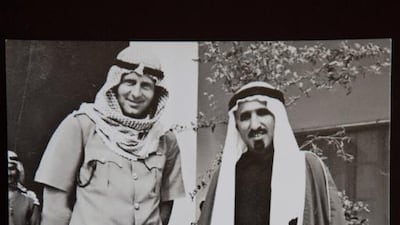RAS AL KHAIMAH // When Sheikh Saqr asked his men who should be responsible for his sheikhdom's protection before unification, they suggested a tall Briton whose blond hair was hidden by his checked ghutra.
Aged 30, Lt Col David Neild was the youngest officer of the Trucial Oman Scouts (TOS), the British security forces present in the Trucial States.
The men of his regiment knew of his loyalty to the region, a loyalty some felt ran too deep.
It was Lt Col Neild's second posting to the Trucial States, where he had first come in 1959, just out of his teens. After his first tour, he served in Kenya, Berlin, Northern Ireland and other parts of the UK before reapplying for the TOS.
"I started getting hungry for the desert again. I think once the desert has got into your blood, it's hard to get it out again," he said.
"They said, 'You are not Lawrence of Arabia'. But I said 'No, you know, I really must go back or I will consider leaving the army'."
He returned in 1966, weeks before the accession of Sheikh Zayed, father of the UAE and its founding President.
Lt Col Neild, who is originally from Portsmouth, came to know the late Sheikh Saqr bin Mohammed, the Ruler of Ras Al Khaimah, in 1967, during his time as the first squadron commander based at Hamham.
"I just had enormous respect for him from the start," Lt Col Neild said. "He just had an aura about him. Sheikh Zayed was the same. They were just very special people. Sheikh Rashid of Dubai was the same. Those three stood out as giants."
The respect ran both ways.
Lt Col Neild, who is now 75, caught the sheikh's eye when he helped to resolve a dispute with outlying tribes. He was summoned to the palace and asked to leave the British army to command a local force that would protect the royal family and the emirate's internal affairs.
"It's not every day you get asked to form your own private army," said Lt Col Neild. "I was very honoured but I said I would have to think about it. I was a bachelor and it didn't take long for the adrenalin to kick in.
"It wasn't the money," he said. "It was the challenge.
"Any professional soldier who suddenly is told, 'Form your own private army' - it has only happened to very, very few people ever."
The RAK Mobile Defence Force was formed in 1969. It was the fourth private army to be established along the coast after the British announced plans for a withdrawal from the Trucial States in 1971.
Negotiations were under way for the formation of a union among the seven emirates, Bahrain and Qatar. Two thirds of Ras Al Khaimah's borders were in dispute and American companies were still optimistic about the discovery of oil there.
"We started literally from scratch," said Lt Col Neild. "I was the only British officer ever in it."
Within three years, he had trained 300 RAK citizens and armed the emirate with armoured cars, mortars and machine guns.
"I've never been the most patient of people and one needed a lot of patience and tolerance ... I was very lucky I had very good Arab officers in senior ranks. Without them, we could never have achieved it."
Soldiers did three months of basic training with assistance from the TOS. Many had never held a weapon before.
"It was very much down to a tribal allegiance," said Lt Col Neild. "Sheikh Saqr had the loyalty of his people because he was a great man and everything he ever did, he looked at what was best for Ras Al Khaimah and its people, always."
Having completed three years of service, the Briton left in January 1972, once the mobile force was self-sufficient.
"We had a very close relationship and I said, 'You know I didn't want to stay around if you don't need me any more'."
Weeks later, in Lebanon, he received a telegram requesting his immediate return. The Ruler of Sharjah, Dr Sheikh Khalid bin Mohammed, had been assassinated.
Lt Col Neild came to Sharjah for a year to set up the Sharjah National Guard. Eventually, the Sharjah and RAK units merged into the Union Defence Force.
The forces established a peace that laid the foundation for a modern, independent and united national army.
Lt Col Neild recently returned to live in Ras Al Khaimah with his wife, Eileen, to write his memoirs with regard to the region.
The decision to return to his "true home" came after a visit in February last year with other Britons who had lived in Ras Al Khaimah during the 1960s. They included Ruth Ash, an English nurse who established close ties with mountain tribes, and Margaret McKay, whose husband introduced dairy cows to the region.
More than 40 years have passed and Lt Col Neild is still known by tribesmen as Al Kayad, The Commander.
"If he gave an order, everybody obeyed him," said Rashed Naghmoush, who was 18 when he started training with Lt Col Neild in 1969.
"Because he is a good leader, he controlled the situation. He taught us how to adapt to all situations. We learnt to stop fighting, stop quarrelling, stop shooting.
"Before there was nothing. After the army, there was self-respect."
azacharias@thenational.ae

The Briton who befriended sheikhs and formed an army in Ras Al Khaimah, his true home
A young officer from the Trucial Oman Scouts was asked by Sheikh Saqr to form an army, one that proved to be the basis for a modern, united national army.
Most popular today
